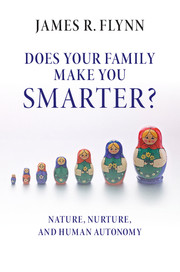Book contents
- Frontmatter
- Dedication
- Epigraph
- Contents
- List of figures, tables and boxes
- Acknowledgments
- Part I Human autonomy
- Part II Intelligence
- 7 The Raven's revolution
- 8 Learning from astronomy
- 9 The meta-theory of intelligence
- 10 Scientific theories of intelligence
- 11 Psychology and Cardinal Bellarmine
- For scholars who wish to use the Age-Table Method to measure family effects in nations other than the USA
- Appendix I Wechsler Vocabulary and description of method of analysis
- Appendix II Stanford-Binet Vocabulary
- Appendix III Raven's Progressive Matrices
- References
- Name index
- Subject index
8 - Learning from astronomy
from Part II - Intelligence
Published online by Cambridge University Press: 05 June 2016
- Frontmatter
- Dedication
- Epigraph
- Contents
- List of figures, tables and boxes
- Acknowledgments
- Part I Human autonomy
- Part II Intelligence
- 7 The Raven's revolution
- 8 Learning from astronomy
- 9 The meta-theory of intelligence
- 10 Scientific theories of intelligence
- 11 Psychology and Cardinal Bellarmine
- For scholars who wish to use the Age-Table Method to measure family effects in nations other than the USA
- Appendix I Wechsler Vocabulary and description of method of analysis
- Appendix II Stanford-Binet Vocabulary
- Appendix III Raven's Progressive Matrices
- References
- Name index
- Subject index
Summary
Questions
(1) Why does astronomy need a meta-theory – which is to say, need heuristics?
(2) How do the heuristics of astronomy differ from its theory-embedded concepts?
Thus far, most of this book has been a contribution to the science of individual differences in intelligence. Previously, I have contributed to the science of how cognitive abilities alter over time. I will now venture into the theory of intelligence, partially for its own sake and partially to put my contributions into context.
I want to show that every science needs something I call a meta-theory just as much as it needs fertile scientific theories and, indeed, that there is a relationship between the two. The latter explain and predict phenomena, whether they pertain to the motions of the planets or to intelligent human behavior. The former consists of one or more heuristics – which is to say, concepts that offer advice to theory builders. This advice can be good or bad in the sense that it can set strictures on scientific theories that limit their explanatory potential. The quality of the meta-theory should be measured in terms of the quality of the scientific theories it engenders. In addition, there must be a body of data that allows both verification and falsification. This last is not passive. Some times new data emerge that signal either a flaw in an existing theory and, therefore, the need for a new theory, or the need for a new meta-theory because it appears that current heuristics are giving bad advice about theory building.
I will begin by demonstrating the need for meta-theory even in the most rigorous of the sciences: astronomy, as inclusive of physics and cosmology. When we review the history of astronomy, we will find that the failure to realize that every science has a meta-theory encourages three kinds of error:
(1) There is a failure to face the fact that new evidence shows that a hitherto successful theory needs to be revised (type-one error). Often this occurs simply because scientists, like anyone else, are reluctant to embrace new ideas. But sometimes, it is because you are under the spell of a heuristic that makes new theories seem “impossible.”
- Type
- Chapter
- Information
- Does your Family Make You Smarter?Nature, Nurture, and Human Autonomy, pp. 97 - 106Publisher: Cambridge University PressPrint publication year: 2016
- 1
- Cited by



